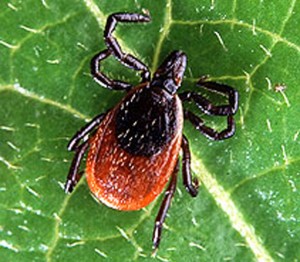 While the frigid winter delayed it a bit, tick season has arrived in Arlington, according to the local Virginia Cooperative Extension office.
While the frigid winter delayed it a bit, tick season has arrived in Arlington, according to the local Virginia Cooperative Extension office.
Several ticks have been found around Arlington and Alexandria, according to VCE staff. All of those found so far have been dog ticks, which could carry Rocky Mountain Spotted Fever. Other ticks that are common to Virginia, but not found in Arlington so far this year, include the lone star tick, which can carry ehrlichiosis, and the deer tick, which can carry Lyme disease.
VCE says anyone who suspects a tick-transmitted disease should talk to a doctor.
The organization has the following advice for residents.
All adult ticks have eight legs, but only six legs as newly hatched larvae. They differ in coloring, size, and shape of the body and mouthparts and in orientation of the anal groove.
Ticks are best removed with tweezers or by wrapping the tick in tissue paper and pulling out with fingers. Pull slowly to avoid leaving the mouthparts in the wound; do not twist or jerk. Do not use nail polish, petroleum jelly, alcohol, or hot matches to remove the tick. Wash the wound with an antiseptic after the tick is removed. Kill the tick in rubbing alcohol and keep it in a small vial for a few months in case any disease symptoms develop.
The Virginia Department of Health also recommends the following methods of prevention:
- Avoid tick infested areas such as tall grass and dense vegetation.
- Walk in the center of trails and avoid brushing against weeds and tall grass.
- Keep grass and underbrush cut and thinned.
- Wear light colored clothing so ticks can be found easily.
- Tuck pant legs into socks so ticks stay on the outside of pants.
- Conduct tick checks on children and pets every four hours.
- Use tick repellents that contain at least 30 percent DEET.
While the VDH also recommends keeping pets outside from April to September to help keep ticks out of the house, both dogs and cats should be checked often before entering a home to ensure that they don’t carry ticks inside. Safe and effective tick control for pets is available.
- Ask your veterinarian to recommend tick controls for your pets.
- Treat your lawn with an approved pesticide for tick control.
Residents with tick-related questions can contact the local Virginia Cooperative Extension help desk. The help desk is staffed from 9:00 a.m. to noon weekdays at the Fairlington Community Center (3308 S. Stafford St.) It can also be reached by email at mgarlalex@gmail.com and by phone at 703-228-6414.
Photo via U.S. Department of Agriculture







